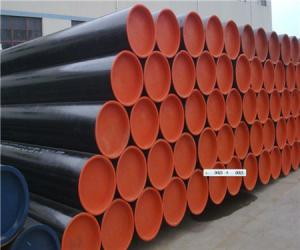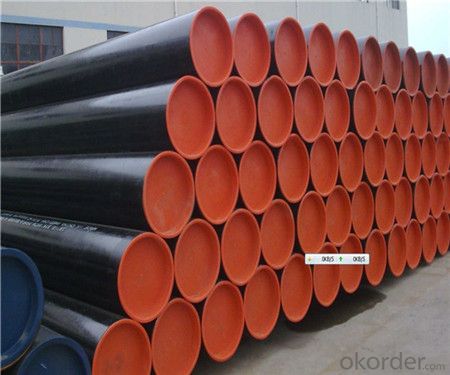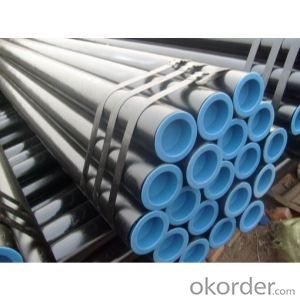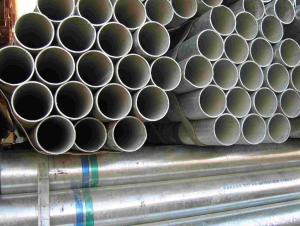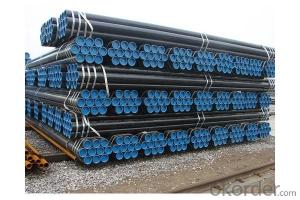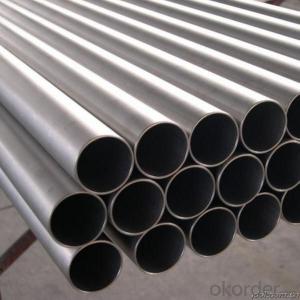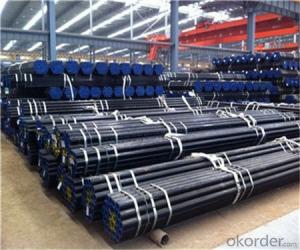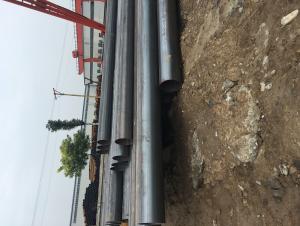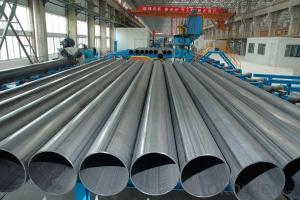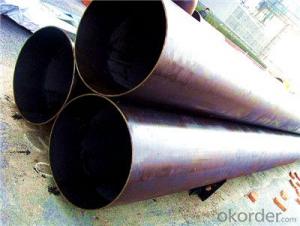ERW Steel Pipe with High Quality Made in China
- Loading Port:
- China Main Port
- Payment Terms:
- TT or LC
- Min Order Qty:
- -
- Supply Capability:
- -
OKorder Service Pledge
OKorder Financial Service
You Might Also Like
1、Structure of High Quality ERW Steel Pipe Made in China:
Seamless pipe is formed by drawing a solid billet over a piercing rod to create the hollow shell. As the manufacturing process does not include any welding, seamless pipes are perceived to be stronger and more reliable. Historically seamless pipe was regarded as withstanding pressure better than other types, and was often more easily available than welded pipe.
2、Main Features of High Quality ERW Steel Pipe Made in China:
• High manufacturing accuracy
• High strength
• Small inertia resistance
• Strong heat dissipation ability
• Good visual effect
• Reasonable price
3、High Quality ERW Steel Pipe Made in China Specification:
Standard | GB, DIN, ASTM ASTM A106-2006, ASTM A53-2007 |
Grade | 10#-45#, 16Mn 10#, 20#, 45#, 16Mn |
Thickness | 8 - 33 mm |
Section Shape | Round |
Outer Diameter | 133 - 219 mm |
Place of Origin | Shandong, China (Mainland) |
Secondary Or Not | Non-secondary |
Application | Hydraulic Pipe |
Technique | Cold Drawn |
Certification | API |
Surface Treatment | factory state or painted black |
Special Pipe | API Pipe |
Alloy Or Not | Non-alloy |
Length | 5-12M |
Outer Diameter | 21.3-610mm |
Grade | 20#, 45#, Q345, API J55, API K55, API L80, API N80, API P110, A53B |
Standard | ASME, ASTM |
1) Material:20#(ASTM A 106/A53 GRB.API5LGRB,GB),45#,16Mn,10#.
2) Specification range:OD:21.3-610mm,WT:6-70mm,length:6-12m or according to the requirement of clients.
3) Excutive standards:GB,ASME API5L.ASTM A 106/A53,Despite of the above standards,we can also supply seamless steel pipe with standard of DIN,JIS,and so on,and also develop new products according to the requirements of our clients!
4) Surface:black lacquered,varnish coating or galvanized.
5) Ends:Beveled or square cut,plastic capped,painted.
6) Packing:bundles wrapped with strong steel strip,seaworthy packing.
4、Packaging & Delivery
Packaging Details: | seaworthy package,bundles wrapped with strong steel strip |
Delivery Detail: | 15-30days after received 30%TT |
5、FAQ of High Quality ERW Steel Pipe Made in China:
①How is the quality of your products?
Our products are manufactured strictly according to national and internaional standard, and we take a test
on every pipe before delivered out. If you want see our quality certifications and all kinds of testing report, please just ask us for it.
Guaranteed: If products’ quality don’t accord to discription as we give or the promise before you place order, we promise 100% refund.
②How about price?
Yes, we are factory and be able to give you lowest price below market one, and we have a policy that “ for saving time and absolutely honest business attitude, we quote as lowest as possible for any customer, and discount can be given according to quantity”,if you like bargain and factory price is not low enough as you think, just don’t waste your time.Please trust the quotation we would give you, it is professional one.
③Why should you chose us?
Chose happens because of quality, then price, We can give you both.Additionally, we can also offer professional products inquiry, products knowledge train(for agents), smooth goods delivery, exellent customer solution proposals.Our service formula: good quality+good price+good service=customer’s trust
SGS test is available, customer inspection before shipping is welcome, third party inspection is no problem.
6.Images
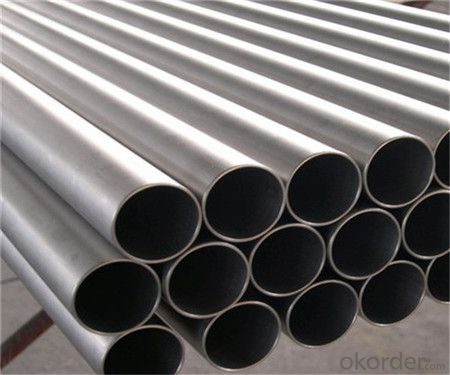

- Q: Can steel pipes be used for hydropower systems?
- Yes, steel pipes can be used for hydropower systems. Steel pipes are commonly used in hydropower systems for various applications such as penstocks, which are used to transport water from a reservoir to a turbine. Steel pipes are preferred for their strength, durability, and ability to withstand high pressure and water flow. They are also resistant to corrosion, making them suitable for long-term use in hydropower systems. Additionally, steel pipes can be easily welded or joined, allowing for flexibility in system design and installation. Overall, steel pipes are a reliable and widely used choice for hydropower systems.
- Q: Can steel pipes be used for conveying food and beverages?
- Steel pipes can be used for conveying food and beverages, but certain precautions need to be taken to ensure their safety and suitability for this purpose. Firstly, it is important to choose food-grade stainless steel pipes that are specifically designed for handling food and beverage products. These pipes are made from high-quality stainless steel that is resistant to corrosion and does not leach harmful substances into the food or beverage. Secondly, the pipes should be properly cleaned and sanitized before and after each use to maintain hygiene standards. Regular cleaning and maintenance will prevent the accumulation of bacteria or contaminants that could potentially contaminate the food or beverage being transported. Additionally, it is crucial to consider the compatibility of the food or beverage with the steel pipes. Certain acidic or corrosive substances may react with the steel, causing contamination or compromising the integrity of the pipes. In such cases, alternative materials like food-grade plastic or rubber may be more suitable. Overall, steel pipes can be used for conveying food and beverages, but it is essential to ensure the use of food-grade stainless steel pipes, proper cleaning and sanitization, and compatibility with the specific food or beverage being transported. Following these guidelines will help maintain the safety and quality of the food or beverage during transportation.
- Q: What are the advantages of using steel pipes in construction projects?
- There are several advantages of using steel pipes in construction projects. Firstly, steel pipes are incredibly strong and durable, making them ideal for carrying heavy loads and withstanding harsh environmental conditions. Secondly, steel pipes have a high resistance to corrosion, which ensures a longer lifespan and reduces maintenance costs. Additionally, steel pipes are lightweight, making them easier to transport and install. Lastly, steel pipes are versatile and can be used for various applications such as water supply, sewage systems, gas pipelines, and structural support.
- Q: What are the different methods of pipe welding for steel pipes?
- There are several methods of pipe welding for steel pipes, including Shielded Metal Arc Welding (SMAW), Gas Metal Arc Welding (GMAW), Flux-Cored Arc Welding (FCAW), Submerged Arc Welding (SAW), and Tungsten Inert Gas Welding (TIG). Each method has its own advantages and is used depending on the specific requirements of the project, such as the thickness of the pipe, the type of steel, and the desired weld quality.
- Q: How can steel pipes be protected from corrosion?
- There are several methods available to protect steel pipes from corrosion. One commonly used method is the application of protective coatings, which create a barrier between the steel and the corrosive elements in the environment. Epoxy is the most widely used coating for steel pipes and offers excellent corrosion resistance. Depending on the specific requirements, polyethylene and polyurethane coatings can also be used. Another effective way to prevent corrosion is through cathodic protection. This technique involves using sacrificial anodes or impressed current systems. Sacrificial anodes, typically made of zinc or aluminum, are attached to the steel pipes and corrode instead of the steel, sacrificing themselves to protect the pipes. Impressed current systems utilize a direct electrical current to counteract the corrosion process. To ensure the longevity of steel pipes, regular maintenance and inspection are crucial. It is important to monitor the condition of the coatings and address any signs of damage or deterioration promptly. Additionally, implementing proper drainage systems to prevent the accumulation of moisture around the pipes is essential for corrosion prevention. Consideration of environmental factors is also necessary when protecting steel pipes from corrosion. This involves mitigating exposure to corrosive substances like acids or chemicals and ensuring adequate ventilation and airflow to prevent moisture and humidity buildup. By implementing a combination of these protective measures, steel pipes can have an extended lifespan and maintain their structural integrity.
- Q: How does galvanization protect steel pipes from corrosion?
- Galvanization protects steel pipes from corrosion by forming a protective zinc coating on the surface of the pipes. This zinc coating acts as a barrier between the steel and the surrounding environment, preventing moisture and corrosive elements from reaching the steel. Additionally, if the zinc coating is damaged, it sacrificially corrodes before the steel, further protecting the pipes from rust and corrosion.
- Q: What is the difference between steel pipe and concrete pipe?
- The main difference between steel pipe and concrete pipe lies in their material composition. Steel pipes are made from steel, which provides strength, durability, and resistance to corrosion. On the other hand, concrete pipes are made from a mixture of cement, aggregates, and reinforcing materials, offering advantages such as fire resistance and the ability to withstand high pressure. While steel pipes are commonly used for transporting fluids and gases, concrete pipes are often used in drainage and sewage systems.
- Q: Can steel pipes be used for geothermal systems?
- Yes, steel pipes can be used for geothermal systems. Steel is a commonly used material for geothermal applications due to its durability, strength, and resistance to corrosion. It can effectively withstand the high temperatures and pressures associated with geothermal systems, making it a suitable choice for transporting the geothermal fluid to and from the heat source.
- Q: What are the common maintenance practices for steel pipes?
- The common maintenance practices for steel pipes include regular inspections for signs of corrosion or damage, cleaning and removing any debris or obstructions, applying protective coatings to prevent rust and corrosion, and conducting periodic leak tests to ensure the integrity of the pipes. Additionally, proper handling and storage procedures should be followed to prevent any physical damage or contamination.
- Q: What are the different types of steel pipes available in the market?
- In the market, one can find a variety of steel pipes, each designed for specific purposes and applications. Some of the commonly used types are as follows: 1. Carbon Steel Pipes: These pipes are widely utilized due to their strength and durability. They are primarily employed in industries like oil and gas, construction, and plumbing for fluid and gas transportation. 2. Alloy Steel Pipes: By combining carbon steel with different metals like chromium, nickel, or molybdenum, alloy steel pipes offer enhanced strength, corrosion resistance, and heat resistance. They find applications in high-pressure environments such as power plants and chemical plants. 3. Stainless Steel Pipes: Highly resistant to corrosion and oxidation, stainless steel pipes are suitable for applications requiring hygiene and durability. Industries like food processing, pharmaceuticals, and water treatment commonly use them. 4. Galvanized Steel Pipes: These pipes are coated with a layer of zinc to protect against rust and corrosion. They are commonly found in plumbing systems and structures like fences and handrails. 5. Seamless Steel Pipes: These pipes are manufactured without any welding or joints, resulting in a smooth and continuous surface. They are known for their high strength and are often used in high-pressure applications. 6. Welded Steel Pipes: Made by rolling or bending a flat steel plate into a cylindrical shape and welding the edges together, welded pipes find common usage in construction, oil and gas, and automotive industries. 7. ERW (Electric Resistance Welded) Steel Pipes: ERW pipes are produced by passing a high-frequency electrical current through a steel strip, causing it to heat and form a weld. They are widely utilized in plumbing, water wells, and structural support. 8. LSAW (Longitudinal Submerged Arc Welded) Steel Pipes: LSAW pipes are created by bending and welding steel plates into a cylindrical shape. They are commonly employed for long-distance transportation of large volumes of oil, gas, or water. These examples represent only a fraction of the diverse range of steel pipes available in the market. The choice of the appropriate pipe type depends on factors such as the intended application, environmental conditions, and budget constraints. Consulting with experts or professionals is crucial in determining the most suitable steel pipe for a specific project or application.
Send your message to us
ERW Steel Pipe with High Quality Made in China
- Loading Port:
- China Main Port
- Payment Terms:
- TT or LC
- Min Order Qty:
- -
- Supply Capability:
- -
OKorder Service Pledge
OKorder Financial Service
Similar products
Hot products
Hot Searches
Related keywords
